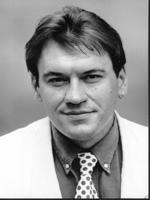Rubén Amoretti
The case of Rubén Amoretti is probably unique in the history of operatic chant, and that's no empty phrase. Amoretti is a very decent bass who also sings some baritone roles. Imagine a career between Zaccaria in Sassari and Capulet at the Liceu in Barcelona; between Escamillo at the Teatro de la Zarzuela in Madrid and Roucher (Andrea Chénier's baritone friend) at La Scala. That's what it used to be since 2007. But that's not the whole story, and not the exceptional part of it. Amoretti started as a nightclub singer, obviously in France since he was a colleague of Roberto Alagna, who did the same job at the time; the two men have been friends ever since. And like Alagna, also Amoretti started studying voice (at age 24), at the Indiana University and with Nicolai Gedda in Geneva, and became a tenor. Not quite on Alagna's level of prominence (and at that long bygone period, even of excellence); although Amoretti made it to the Zürich Opera House, he may have been better off when singing at places like Palm Beach, or Bloomington (Indiana), where he had made his 1991 debut as Almaviva.
After a few years, he got into increasing trouble with his top register. Although his technique was certainly not great, it was, as it would turn out much later, not the reason for his vocal decline. When Alagna sang his first Canio in Santander in 2000, he invited Amoretti to be his Beppe. That performance is probably Amoretti's best-known recording (no doubt much to his disgrace) – and it was the end of his tenor career. Hear why:
Amoretti was devastated, and stopped singing opera entirely; he returned to singing tangos in nightclubs, always chasing his lost
tenor register, with mixed success. Four years later, one night at a hotel bar in Italy, he plunked on the piano – and to
his utter amazement discovered that he could hit a low C without effort. He had developed into a basso profondo without knowing
it!
It was, once again, Roberto Alagna who encouraged him to retry opera as a bass; he also advised him not to consult a voice teacher
since his second breaking of the voice seemed too weird to be possibly dealt with by book knowledge. And so Amoretti studied
bass singing for himself, based on Cesare Siepi's recordings, for three years. In 2007, at age 43, he made his second debut.
After a concert in Zürich, a spectator approached Amoretti: "Several years ago, I've heard you as Almaviva. I'm a medical
doctor. Do you suffer from pain in the limbs, and headaches?" Amoretti confirmed, he did. And the music loving doctor instantly
diagosed him with acromegaly: a rare disease where a (basically benign) brain tumor causes the pituitary gland to produce
growth hormons at an age when it should long have ceased to. Now adult people can hardly grow as far as body height (and yet
Amoretti gained five centimeters during the fourth decade of his life); so what primarily grows in acromegaly patients are the
internal organs, particularly also the larynx – and hence the vocal cords. The longer those cords, the deeper the voice,
and so the reason for Amoretti's loss of the tenor (and gain of the bass) register was a result of his undetected illness.
What also grows in acromegaly patients is the heart, until it lethally fails because there is literally no space left for it in
the chest. Of course, Amoretti got his tumor removed timely, in 2012, and had his health thus restored. His case was spectacular
enough that his surgeon presented it to the Royal European Academy of Doctors in Barcelona.
The strange and surprising outcome of this incredible story was, for Amoretti, that he became a distinctly better bass-baritone
than the young tenor that he had previously been.
Reference 1; reference 2: El Correo, 25 March 2018; reference 3
I wish to thank Daniele Godor for the recording (Pagliacci). |
